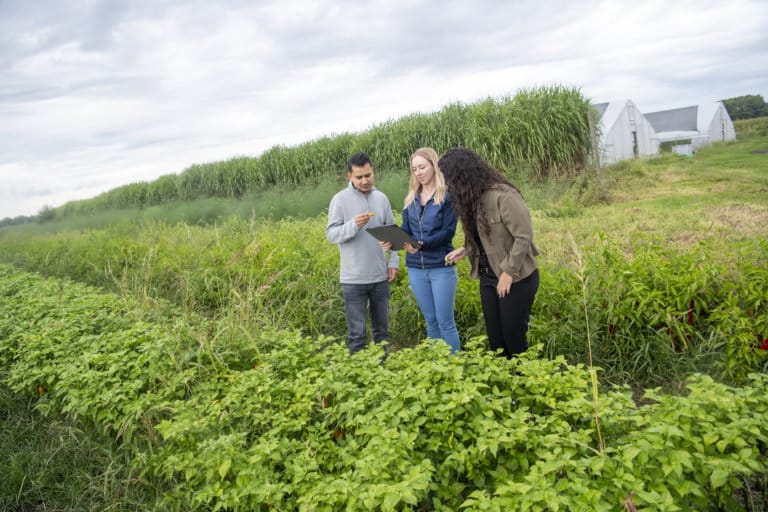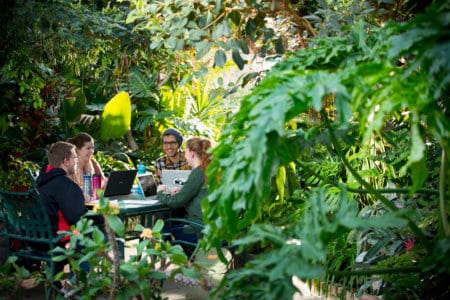
It is easy to take everyday necessities for granted. Things like clothes and food are so integral to our survival and yet we forget to think about where it came from or what it took to get to us. In a world battling climate change, the advancement of agriculture is key to developing more eco-conscious and ethical ways to cultivate soil, grow crops and raise livestock.
Scholars found that around 20,000 years ago the majority of the Earth’s population became dependent on agriculture. Gone were the days when people spent their entire lives in search of food, but instead we learnt how to farm what we need. Today agriculture is the backbone of society and embarking on studies in this field is a noble pursuit.
When deciding where to study agriculture it is important to consider schools that have made strides in their research as well as employing faculty who are pioneering innovation. Here are four universities whose research programmes are aimed at making a real impact:
UIUC College of ACES
Ready to change the world? The College of Agricultural, Consumer and Environmental Sciences (ACES) at the University of Illinois Urbana-Champaign trains students to solve climate change, food security, sustainability and more.
“I love almost every aspect that my major has to offer: dedicated and helpful advisors, world-renowned faculty (who offer a wide range of research opportunities), and supportive classmates,” said Stuart Seputro, who studied crop sciences (concentration in plant biotechnology).
The College of ACES is considered one of the top agricultural schools worldwide with a 91% freshman retention and 75% four-year graduation rate, according to US News and World Report. Beyond agriculture, the college offers academic programmes and research opportunities that span environmental sciences, animal sciences, engineering, agribusiness, finance, economics, law, nutritional science, and communications.
No matter your area of interest, an education here arms you with a wide arsenal to combat real issues and change the world. “You won’t regret choosing the College of ACES,” Seputro said. “ACES has strong alumni connections that can help prepare you for your post-graduation plan.”
By defying disciplinary boundaries, teaching and research here aim to improve global prosperity and help people live happy, healthy lives. Chengxu (Gary) Liu is double majoring in crop sciences (concentration in agroecology) and natural resources and environmental sciences (concentration in fish, wildlife, and conservation biology) to integrate environmental remediation into the agroecosystem. “I am determined to study the environment, wildlife, and conservation to make our planet a better place to dwell,” said Liu.
Liu plans to go to graduate school to research environmental engineering and later to become an environmental engineer or specialist to help the planet and society cope with contemporary environmental and agroecological issues. To find out how the College of ACES can make your vision a reality, click here.
University of California, Davis, College of Agricultural and Environmental Sciences

The College of Agricultural and Environmental Sciences contributes to the livelihood of people in California and all over the world. Source: University of California, Davis
The College of Agricultural and Environmental Sciences at the University of California, Davis boasts a number of accolades — ranked #1 in the US and #2 in the world for agricultural sciences and forestry by QS World University Rankings and #1 in agricultural economics and policy research by the Centre for World University Rankings.
Three faculty members are American Association for the Advancement of Sciences Fellows and nine are National Academy of Sciences members, so naturally the institution is also one of the most published and cited US research universities in agricultural sciences, plant and animal sciences, environment/ecology, food science and nutrition, and soil sciences.
Scientists at UC Davis are supported by the Agricultural Experiment Station funding, and they focus on agricultural, environmental, as well as human and social sciences. In one case, they found that adding a little seaweed to cattle feed cut greenhouse gas emissions by up to 80%. Researchers also discovered that by simply adding a bright yellow warning label to fruit-flavoured drinks and sweetened beverages in the college cafeteria, they were able to reduce consumption of sugar-sweetened liquids by 14.5%.
It is clear that research by the College of Agricultural and Environmental Sciences contributes to the livelihood of people in California and all over the world.
University of Arizona, College of Agriculture and Life Sciences

The University of Arizona’s College of Agriculture and Life Sciences (CALS) is perfectly located in the Southern Arizona desert. Source: University of Arizona
Offering 20 undergraduate degree programmes across five schools and five departments, the University of Arizona’s College of Agriculture and Life Sciences (CALS) is perfectly located in the Southern Arizona desert, giving students the ideal environment to offer solutions for global issues. The Arizona Experiment Station supports student research with state-of-the-art facilities to explore a range of studies from traditional agriculture to landscape change and cyber technologies.
A recent US Census Bureau release states that students who graduate within fields offered in CALS hold one of the five highest-paying degrees. A graduate’s average starting salary is US$51,220 (a potential of $2.6 million in lifetime earnings) and tends to make over US$800,000 more than other college graduates.
Here, students can explore more than 20 disciplines and 30 emphasis areas to customise a degree that suits their interests. To encourage healthy competition there is the “CALS Grad Slam,” a chance for graduate students across the college’s 10 schools and departments to showcase their research and get feedback from a panel of expert faculty judges.
Not only can participants practise their proposals, but it also gives them insight into navigating real-world problems and working out solutions. CALS researchers have the opportunity to work with scientists from around the world to solve real economic, social and environmental issues.
Florida A&M University, College of Agriculture and Food Sciences

The Cooperative Extension Programme (CEP) provides research-based information to Florida’s farmers, communities and those in the agriculture business. Source: Florida A&M University
With a low student-to-faculty ratio affording individual attention for each student, Florida A&M University’s College of Agriculture and Food Sciences (CAFS) is the ideal school to learn the right tools to tackle the challenges of the 21st century. The school’s research centres focus on viticulture and small fruits research; preserving the water quality of North Florida watersheds research; strategic research for the management of invasive pest species; and a livestock and crop improvement programme.
As the land-grant college within Florida A&M University, CAFS has a Cooperative Extension Programme (CEP) that provides research-based information to Florida’s farmers, communities and those in the agriculture business. Exploring both rural and urban areas, the CEP programme aims to improve the quality of life of everyone involved.
CAFS also includes a few outreach programmes that directly help the community. Under Agriculture and Natural Resources, the aim is to increase awareness and make efficient use of Florida’s natural resources by way of educational programmes for smaller scale producers. There is even the Family and Consumer Sciences programme for individuals and families to learn the skills for healthy and financially independent lives. “Although our research is geared to solve local problems, many of our research findings also have widespread, global applications,” says Stephen Leong, Associate Dean for Research.
*Some of the institutions featured in this article are commercial partners of Study International










